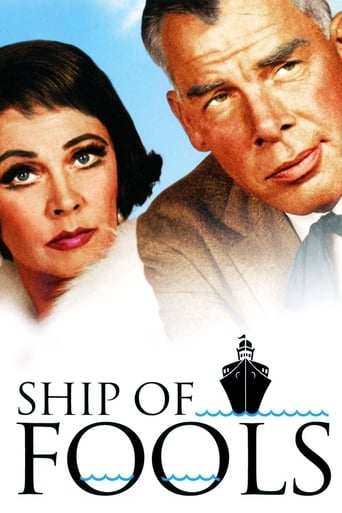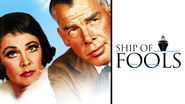kijii
The movie, based on Anne Porter's book, presents a tapestry of several characters on an ocean voyage. Their vessel is a German luxury linear sailing from Veracurz, Mexico to Bremerhaven, Germany in 1933. All of the crew and most of the passenger on the ship are German, but there are also Spanish , Mexican, and American passengers too. The prologue and epilogue of the movie are presented by on of the passengers, a dwarf, Carl Glocken (Michael Dunn). In the prologue, Glocken looks into the camera and tells the audience: "My name is Carl Glocken and this is a ship of fools. I'm a fool. You'll meet more fools as we go along. This tub is packed with them. Emancipated ladies, ball players, lovers, dog lovers, ladies of joy, tolerant Jews..dwarfs..all kinds. And, who knows? If you look closely enough, you may find yourself on board." As the ship embarks, the ship's captain (Charles Korvin) asks the ship's doctor (Oskar Werner), to take his place at the captain's table the first night since he has seen the passengers, and he tires of such people. The most obnoxious guest at the captain's table is Rieber (Jose Ferrer), who speaks loudly of racial purity and society ridding itself of undesirables, while extolling the glorious future of Germany. Though the guests at the table tolerant his speech, most seem mildly annoyed by it. Noticeably absent from the captain's table is an elderly Jewish man, Lowenthal (Heinz Ruehmann) and the dwarf, Glocken. (These two are forced to sit at a side table.) One of the great satirical paradoxes that the movie creates is making Lowenthal and Rieber cabin mates. While Lowenthal is good-spirited about the situation, his snoring only further aggravates Rieber's disgust. Soon after the voyage begins, the ship stops to take on a large group of revolutionary Mexican peasants who are immediately placed in steerage and hosed down like a heard of cattle. At the same time, La Condesa (Simon Signoret) comes aboard as a political prisoner. Other characters on the ship include: an aging American divorcée , Mary Treadwell (Vivien Leigh); a washed up baseball player, Tenny (Lee Marvin); and two American lovers, Jenny and David (Elizabeth Ashley and George Segal). There is also a troop of Spaniards—headed by Pepe (Jose Greco). While on stage, these Spaniards seem to entertain the other passengers as flamenco dancers and musicians; while off stage, they become pimps and prostitutes. (The relationship between the Spaniards and the Germans seems like one between sycophants and masters and may foreshadow the relationship between Franco's Spain and Hitler's Germany later in the 1930s).The four Americans don't escape satire either: they all are self- absorbed, hedonistic, and superficial. At one time, Tenny tells Glocken that the outside curve ball ended his baseball career and "ruined his life." Glocken retorts that it is hard to imagine that anything that 99% of the world's population had never even heard of could ruin anyone's life!! Another vignette in the movie shows a Mexican peasant drown after jumping overboard to save one of the German passenger's dog. Both the characters and their situations vary from sad, to silly, to absurd.The worst developed relationship in the movie is between La Condesa and the ship's doctor. The ship's doctor " a bad heart" and is running away from the responsibilities of his wife and family. He tries to help La Condesa free herself from drug addition, but later learns how much more valuable and responsible her life has been than his.The most sadly prophetic conversation in the movie is between Glocken (the dwarf) and Lowenthal (the good natured Jew). After referring to Bach and Beethoven, Lowenthal claims to be more of a German than a Jew. "After all," he says, "There are a million Jews in Germany. What are they going to do—kill us all?While disembarking from the ship in Bremerhaven, Glocken looks into the camera again and delivers the movie's epilogue to the audience: "Oh, I just hear you say, what does this have to do with us?""Nothing."(chuckles sarcastically).
MartinHafer
Tonight was the second time I tried to watch "Ship of Fools". The first time, I hated it and couldn't understand its relatively high rating. A few years later, I thought I'd try it again--after all, there are a lot of reviewers who gave this one a 10. Unfortunately, in retrospect my first reaction was confirmed--I did not like this film. Why? Well, there are a few main reasons. First, at times the dialog was simply god-awful--completely impossible to believe and even painful. The worst was the 'love scene'(???) between Elizabeth Ashley and George Segal--it seemed like no conversation I would ever expect from two folks in love and seemed...bad. Second, too many of the characters just seemed like archetypes--too stereotypical and too simple. The bad people are simply bad and the good ones are noble. Third, because the film is set on a ship, there isn't anything to do but just talk...talk...talk. Fourth, and this is probably because I am a retired history teacher, some of the costuming was terrible. Christiane Schmidtmer's hair and costumes were NOT from the 1930s but would have looked rather fashionable in 1965.The bottom line is that there have been countless films that have dealt with fascism much more effectively. You can easily do better. I did, however, love the bulldog.
lasttimeisaw
There is a ship full of passengers in the film, but it is not Titanic, there's no icebergs either, with a satirical overtone, this Oscar-winning (BEST ART DIRECTION and CINEMATOGRAPHY in B&W section) film from Hollywood's ill-fated tycoon Stanley Kramer, who has nominated for 9 Oscars without a single win, could be best interpreted as a bourgeois lampoon to the times before WWII (1930s). The hotchpotch of the first-class passengers (from Mexico to Europe) depicted in the film are complying with the milieu of that particular period, notably the 3 Oscar-nominated performance from Simone Signoret, Oskar Werner and Michael Dunn (the latter is a very interesting example of a nomination from a normally pedestrian presence, I hope the dwarf card is not the case here), and judging by my taste, Heinz Rühmann and Vivien Leigh are also quite in the top form, especially Ms. Leigh, not to mention her turbulent real life status at that time, her frail with dignity performance is rather too harrowing to watch. However the true heartrending sympathy I am able to sense is from a divine Simone Signoret, a countess on exile, along with her foredooming love story with the inward doctor on board Oskar Werner. One thing niggling me is the film's aloof stance towards the poor underclass, they are living in another parallel world even though they are on the exactly same boat with those well-off patrons in the first class. I expected that the film could have gone much further by creating the contradictions between these two classes and which would be more emotionally radical to underline the more meaningful exposition on human's prejudices. But the film doesn't offer this on its tilted menu and most characters are indulging themselves in their own insignificant trifles which I easily lost my absorption to address myself to.
DKosty123
A black & white film, this film has a good script & a really talented cast. Besides Viven Lee in her last picture (& not performing at her best by this time) we have Lee Marvin the same year he was doing Cat Ballou for which he was Oscar nominated. Werner Kemperer (Col Klink on Hogans Heros) as a junior officer. Elizabeth Ashley as a younger woman who is still busy today as an actress. Michael Dunn as the narrator & in a role received his only Oscar nomination for this film. There are others including Jose Ferrer but you get the idea there is a lot of talent in this cast.This film won two Oscars in a year when there was a fair amount of good films around besides this one. Stanley Kraemer who is a good director is quite able in doing the direction. The story is from a novel which was the most major of works by it's author.The story is about a German crewed ship heading for Germany during the 1930's at the time Adolf Hitler was taking power. There are conversations about discrimination & a lot of other hot topics of the time. Most of the folks have no idea what they are sailing into, yet the story is very good at bringing out the issues. It is quite literally a ship of fools cruising into a major disaster of Nazi tyranny.Michael Dunn at this time is just about getting started as his most remembered role as Dr. Loveless on The Wild Wild West. This is one of the few films I have seen him in & was very happy to see it. Dunn shows here a lot of ability & definitely deserved the nomination. He even has the last lines of the film, quite an honor for an actor to perform so well that Kraemer gave him this honor.This film is worth looking at just for the talented cast, but script is a dandy here as well. It shows a lot of intelligence in it's historic setting & a great job of adapting a difficult novel to adapt to the screen. The film is in Black & White & is well photographed.






